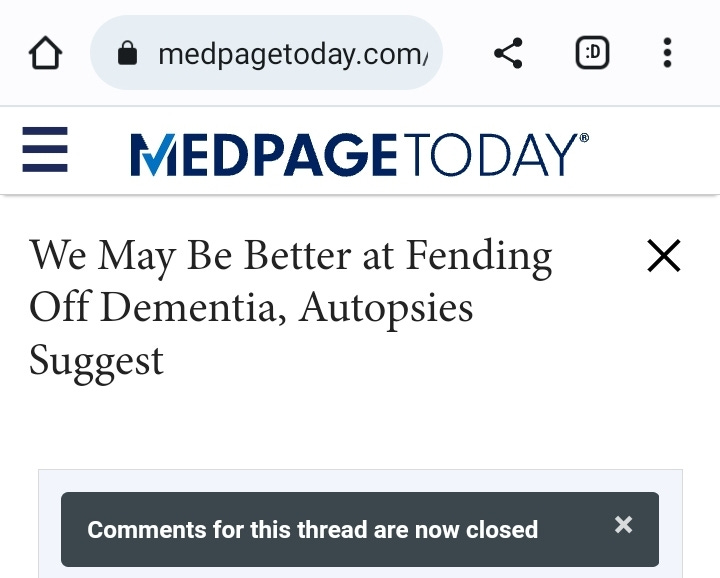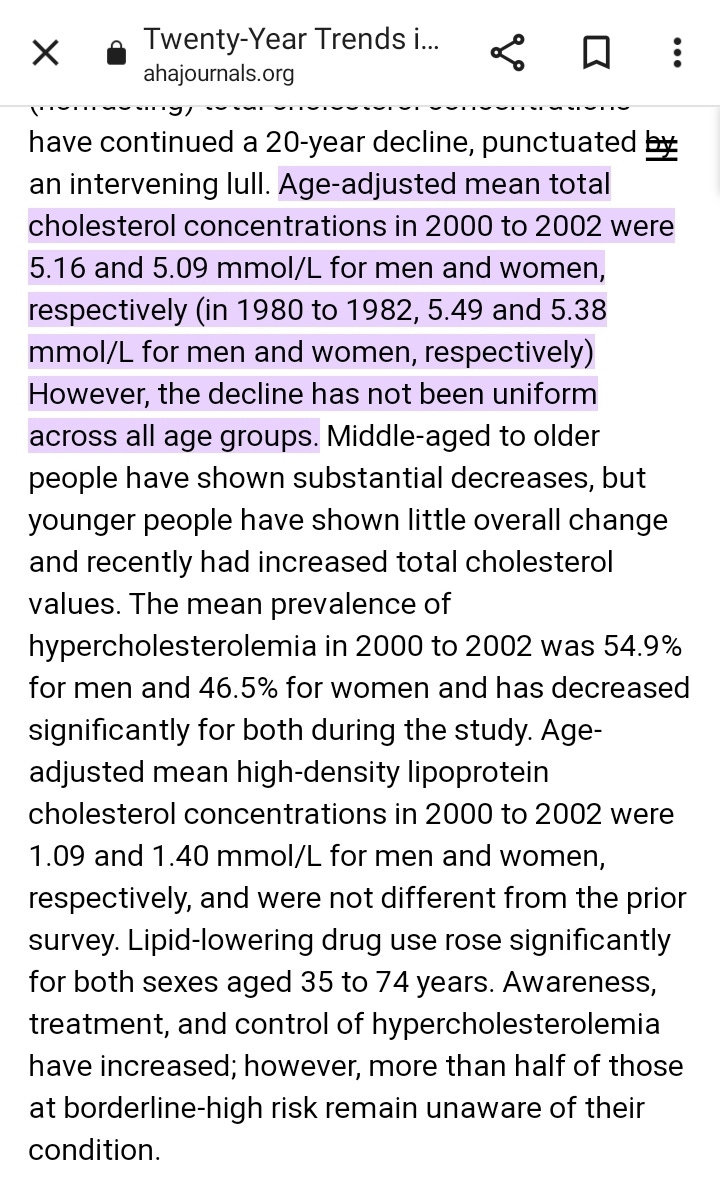Dementia less bad, or statin use an unidentified confounding variable?
Returning to your normal programming of nutrients and how great they are.
Comments were closed on this article with a misleading title: We May Be Better at Fending Off Dementia, Autopsies [really don’t] Suggest (MedPage Today)
The dementia rate was the same across all age brackets evaluated while tau levels were higher in the younger age brackets and the rate of atherosclerosis and arteriosclerosis dropped somewhat in the younger age groups.
This reduction in vessel cholesterol type conditions was taken as a positive sign - that the medical response has been helping reduce the vessel damage and that must be helping the dementia too -’ even though the dementia rates were the same AND A WHOPPING 68%.
68% of my own grandparents did not develop dementia - zero percent did while living to their 80s, 90s and 103 (one died at a younger 50s but not with dementia).
The bigger question the study needed to ask was why didn't a reduction in “atherosclerosis or arteriosclerosis” make any difference in the dementia rates? And the tau levels went up in age brackets where the arteriosclerosis and atherosclerosis had decreased.
. . . Suggesting something else is going on, rather than “the medical system being better at fending off dementia”.
Yet the tone of the article is one of success “We're helping reduce dementia” yet all age brackets were near a whopping 68% with dementia. Why are 2/3rds of older people getting dementia even though levels of arteriosclerosis and atherosclerosis seems to have decreased?
Easy Button answer: The increased use of statins over several decades could readily explain the decrease in atherosclerosis and arteriosclerosis seen in the elderly age brackets.
Yet the neuroinflammation was still present suggesting that reducing cholesterol is not protective. Atherosclerosis may really be a low magnesium with excess calcium problem, which the body tries to spackle over with cholesterol- which would insulate/cap the calcium’s electrically destructive power.
Give statins > reduce cholesterol > reduce blood vessel spackling » Yet where is the excess free calcium going now and what is it doing there?
Logical answer: Continuing to cause dementia would be my thought.
https://www.medpagetoday.com/neurology/dementia/103179
Addition - support for why I would bring up statins when the research didn't- statin use has become incredibly common, particularly in older age groups. And cholesterol sulfate is protective against misfolded proteins and cholesterol may be protecting against free calcium when there is excess. That is a topic I have been looking into for over a decade.
https://www.ahajournals.org/doi/10.1161/circulationaha.105.549857.
Statins can reduce atherosclerosis in elderly or younger adults and may reduce risk of stroke but has not shown a reduction in all-cause or cardiovascular mortality rates - suggesting it isn't an adequate answer to what causes the plaque formation.
https://www.ncbi.nlm.nih.gov/pmc/articles/PMC6915405/.
“The use of statins increased from 18% to 26%. By 2011–2012, 93% of adults using a cholesterol-lowering medication used a statin. Cholesterol-lowering medication use increased with age, from 17% of adults aged 40–59 to 48% of adults aged 75 and over.” (cdc.gov)
When 48% of adults 75 and over have been taking statins, then a study finding that 68% of older adults have dementia, really should take into account that 48% of adults in the age group may have used statin medications too. Changes in atherosclerosis would be more likely to have been due to statin use than treatments used for dementia which tend to target amyloid or simply be psychiatric medications (that tend to deplete magnesium and B vitamins). See for early draft: Disturbingly transparent Table. Oct. 16, 2022. (substack.com)
Coincidentally, or casually 🤔, magnesium deficiency causes atherosclerosis build up.
If your doctor is not mentioning magnesium while discussing dementia or heart disease, THEN PLEASE SEEK A SECOND OPINION. Or better yet seek a book and give a copy to your physician. If they say they don’t have time to read it, then that is another really good reason to leave. Continuing education is an ongoing need and requirement for all health professionals because the field of knowledge changes - or it SHOULD as we learn more. Instead, we have billions of donated research dollars and government grants wasted on the 201st medication designed to shovel out amyloid from the horse’s stall where more will be created pretty quickly. Magnesium actually helps prevent amyloid buildup - it helps lead the horse out of the stall into greener pastures.
Magnesium in the Central Nervous System, Vink and Nechifor, 2011, available for free download from the University of Adelaide/link/, thanks for the good read!
Suppressing use of magnesium medically is part of the culling tactics, along with iodine, methyl Bs, and zinc.
Our elderly people are not well because of excess toxins and too little nutrients. You can call me “irresponsible” for mentioning that nutrient deficiencies cause physical and mental illness, or you can call the For-Profit medical industry dangerously wrong. I go with the second statement. I would call myself medically irresponsible to not point out that patients are being mistreated while the underlying inflammatory problem is being ignored and left untreated or added to and made worse by ‘treatments’ that increase inflammation or loss of magnesium. Many medications can cause increased magnesium loss in the kidneys or may decrease GI absorption.
Seriously, it is dangerous to seek “help” from people who don’t understand the cause of a problem. Our bodies evolved in a magnesium rich watery environment and topical absorption is expected from our bathing water and drinking water typically was a magnesium source also. Now glyphosate is reducing magnesium in foods and may negatively affect vitamin D metabolism and increase risk of misfolded amyloid or other proteins.
Related posts in my archives for “magnesium atherosclerosis”:
Atherosclerosis/CVD:
Calcification of soft tissue - hardening organs and softening bone, Aug. 19, 2011, (substack.com)
Magnesium- protects against vascular calcification, Jan. 6, 2021, (substack.com)
Links on heart disease, calcium and iodine. June 4, 2018, (substack.com)
Ideally, stop endothelial dysfunction before the mystery bruise stage. Sept. 18, 2022, (substack.com) CoV related post.
See for an overview: To have optimal Magnesium needs Protein and Phospholipids too. July 20, 2018, (substack.com)
See for an overview: Magnesium - essential for eighty percent of our body's chemistry. July 1, 2019, (substack.com)
Autoimmune/allergy risk: Magnesium is needed for vitamin D metabolism to work, and adequate protein also. Autoimmune disease is more of a risk when inadequate D - or magnesium - is present. S1 jab version may be different imo than SARS-CoV-2 version. /link to Unglossed-Brian Mowrey. Jan 2, 2023, (substack.com) CoV related post.
Alzheimer’s/autism/misfolded protein risk: Magnesium might help protect against beta amyloid placques. July 24, 2014, (substack.com)
Mental symptoms and chronic degeneration: Magnesium deficiency can cause irritability, anxiety, and chronic degeneration. Oct. 18, 2015, (substack.com)
Cancer:
Magnesium deficiency and cancer - and magnesium sulfate salt, Nov. 26, 2017, (substack.com)
Good news - magnesium protects against cancer. March 22, 2020, (substack.com)
*I got a lot of flack in earlier years for saying “Magnesium protects against cancer,” but it does. Why should I continue to share wrong information just because everyone else does? Why is wrong medical information so protected? Because wrong care is a high profit market. Providing correct care would prevent people from becoming medication users for life, and leading into surgery users and machines that go ‘bing’ users, and nursing home users.
Medications are given instead of telling patients they have inadequate magnesium.
Original Prilosec warning edited - by Jenny, April 14, 2012, (substack.com)
This post also has links/book about medications that are given instead of magnesium by Mildred Seelig and Andrea Rosenoff: Magnesium - essential for eighty percent of our body's chemistry. July 1, 2019, (substack.com)
Aside - I was very disturbed by a nurse home care visitor that said “We will try to keep her in the home - as if it was someone else’s choice and decision. “Patients” lose control over themselves and families do too - or can. Beware.
Additional support from a reply (thanks!): ‘Lipophilic Statins in Subjects with Early Mild Cognitive Impairment: Associations with Conversion to Dementia and Decline in Posterior Cingulate Brain Metabolism in a Long-term Prospective Longitudinal Multi-Center Study,’ (snmjournals.org) — compared to no statin use or other types of statin use, patients who used lipophilic statins were more likely to develop dementia later. Cholesterol levels were not correlated with the risk, only type of statin used.
The Alzheimer's research in the past has focused on drugs that decrease amyloid - over 200 times and have shown it to not really help patient’s symptoms.
Visual metaphor I used recently- if you are shoveling out a barn stall everyday and the next day there is yet more piles of brown stuff - then chances are there is a horse in the stall producing it. You will be shoveling out brown piles for a long time. Look for the horse that is creating misdolded amyloid - and lead it out of the stall.
Related graphic:
This post has the beginning of my series with this graphic - I had to keep adding to it as I learned of my factors.
Hyperinflammation - a positive feedback loop leading to Alzheimer's? (substack.com)
This is the more recent update with citations: Pomegranate products for the nociceptive pain of histamine excess. (substack.com)
Disclaimer: This information is provided for educational purposes within the guidelines of Fair Use. It is not intended to provide individual guidance. Please seek a health care provider for individualized health care guidance.












The brain is made of significant amounts of cholesterol and statins, I seem to recall, are associated with dementia for this reason.
https://jnm.snmjournals.org/content/62/supplement_1/102
Jennifer, your research and how you described cholesterol as a calcium cap with electrical destructive power coincides with my research of how calcium efflux is increased with emf: https://romanshapoval.substack.com/p/how-flu-is-an-electrical-illness
Don't statins also lower testosterone, and by that factor human growth hormone, which would also not help neurodegeneration?